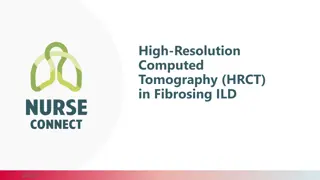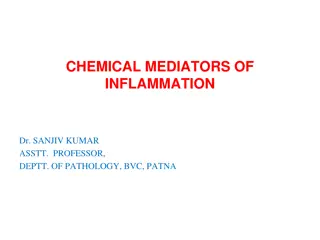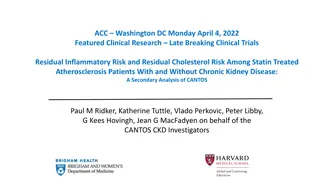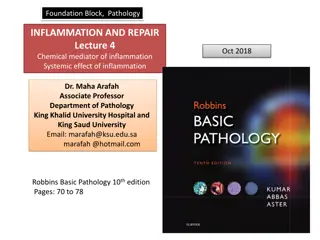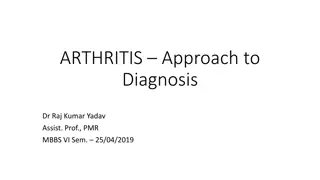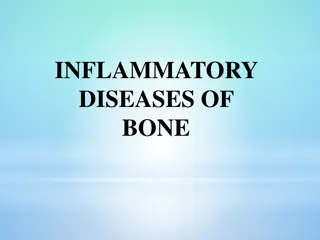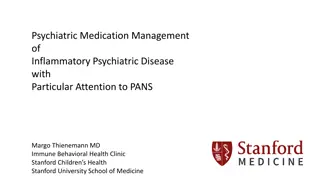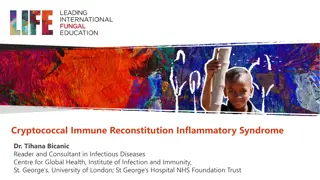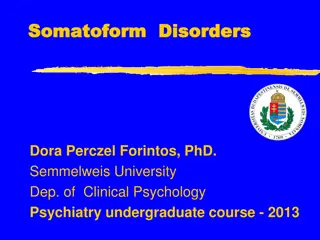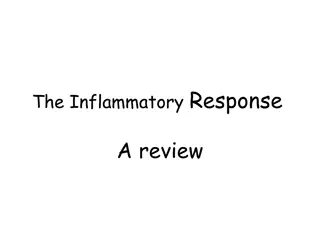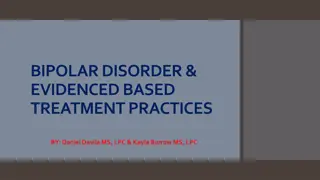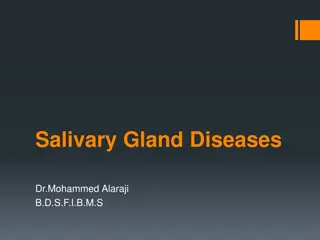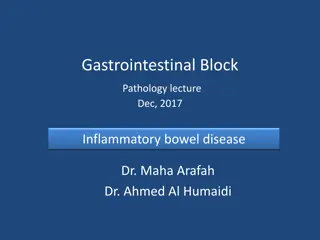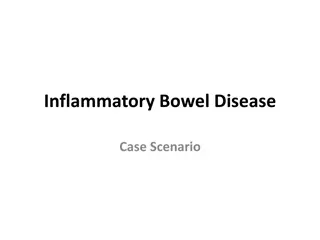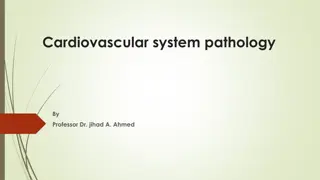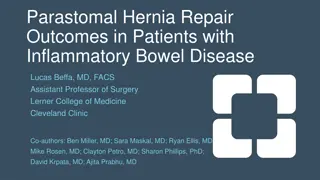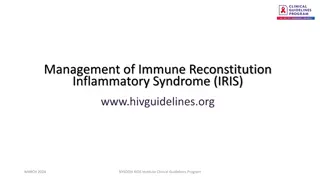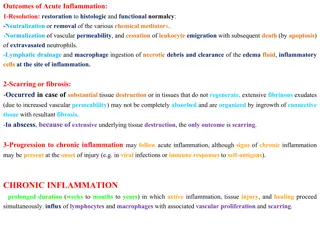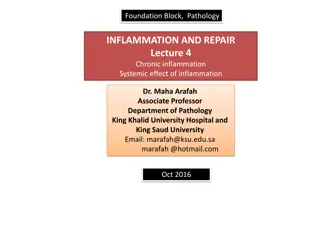Role of High-Resolution Computed Tomography in Fibrosing Interstitial Lung Diseases
HRCT plays a crucial role in diagnosing and monitoring fibrosing interstitial lung diseases (ILDs). It helps identify abnormalities not visible on X-rays, leading to early, accurate diagnoses and potentially avoiding invasive procedures. HRCT assists in distinguishing specific ILDs based on radiogra
1 views • 25 slides
APPROACH TO THE TREATMENT OF INFLAMMATORY POLYARTHRITIS
Inflammatory polyarthritis can have various causes, including infections, systemic rheumatic diseases, crystal-induced arthritis, vasculitides, and more. Dr. Afsar Sayeeda, a consultant internist and rheumatologist, emphasizes early diagnosis and intervention in conditions like rheumatoid arthritis
5 views • 32 slides
Podiatrist's Role in Managing Foot Involvement in Rheumatic Diseases
Rheumatology encompasses over 200 conditions affecting the musculoskeletal system, with foot involvement being significant in conditions like RA and OA. Podiatrists play a crucial role in diagnosing, treating, and preventing foot problems associated with inflammatory arthritis, such as joint damage,
0 views • 20 slides
Hannah's Struggle with Inflammatory Bowel Disease: A Journey of Challenges and Lessons
Hannah, a vibrant young woman with a bustling social life and active routines, experiences a series of setbacks in her battle with Inflammatory Bowel Disease (IBD). Her journey highlights the importance of timely diagnosis, access to proper care, and comprehensive support services to manage the cond
0 views • 9 slides
Understanding Nonsteroidal Anti-Inflammatory Drugs (NSAIDs) and Their Pharmacology
Nonsteroidal anti-inflammatory drugs (NSAIDs) are a class of analgesic, antipyretic, and anti-inflammatory medications that work by inhibiting prostaglandin synthesis. They provide relief from pain, reduce fever, and combat inflammation through various mechanisms. Aspirin, a commonly used NSAID, irr
0 views • 21 slides
Understanding Non-Steroidal Anti-Inflammatory Drugs (NSAIDs): Types and Classification
Non-Steroidal Anti-Inflammatory Drugs (NSAIDs) are a diverse group of medications with analgesic, anti-inflammatory, and antipyretic properties. They act primarily on peripheral pain mechanisms and vary in their selectivity of COX inhibition. This article explores the history, classification, and se
3 views • 16 slides
Understanding Anxiety Disorders and Related Conditions
Explore the distinguishing features of anxiety disorders such as generalized anxiety disorder, panic disorder, and phobias, along with insights into obsessive-compulsive disorder (OCD) and posttraumatic stress disorder (PTSD). Delve into the impact of conditioning, cognition, and biology on these co
2 views • 46 slides
Overview of Chemical Mediators of Inflammation and Their Roles
Chemical mediators of inflammation act on blood vessels and cells to contribute to an inflammatory response. These mediators include vasoactive amines like histamine and serotonin, plasma proteases such as the complement, kinin, and clotting systems, and important inflammatory mediators like C3a and
1 views • 24 slides
Understanding C-Reactive Protein (CRP) Test: Uses and Principle
C-Reactive Protein (CRP) is a liver-produced protein that indicates inflammatory conditions. The CRP test helps detect infections, monitor diseases like cancer, and evaluate inflammatory conditions. The test principle involves latex agglutination for CRP detection in human serum.
0 views • 21 slides
Residual Inflammatory and Cholesterol Risks in Atherosclerosis Patients
In a secondary analysis of the CANTOS study, researchers evaluated the impact of residual inflammatory risk and residual cholesterol risk in a large cohort of atherosclerosis patients already receiving lipid-lowering therapy. Results showed the relative contributions of inflammation and cholesterol
0 views • 11 slides
Chemical Mediators of Inflammation: Understanding Sources and Effects
Chemical mediators of inflammation play a pivotal role in inducing specific events during acute inflammation. These mediators are produced in response to various triggers, including microbial products and host proteins, leading to a cascade of inflammatory responses. Understanding the sources and ef
1 views • 43 slides
Understanding Arthritis: Diagnosis and Pathophysiology
Joint pain can result from various factors such as inflammation, cartilage degeneration, crystal deposition, infection, or trauma. Different pathophysiologic processes necessitate clinical evaluation and identification through history, physical examination, and understanding of joint disease types.
2 views • 49 slides
Understanding the Peritoneum: Structure, Functions, and Inflammatory Responses
The peritoneum, a vital membrane in the body's abdominal cavity, consists of visceral and parietal components with distinct pain perceptions. It plays crucial roles in lubrication, fluid absorption, immune responses, and more. Peritoneal inflammatory exudate can result from various causes such as ba
0 views • 36 slides
Understanding Bipolar Disorder in Older Adults
Bipolar disorder in older adults can have a later onset, often after the age of 50, with episodes of mania and depression. Recognizing symptoms like excessive energy, inability to sleep, and cognitive impairment is crucial. Late-onset bipolar disorder differs from early-onset in familial illness rat
1 views • 12 slides
Overview of Inflammatory Diseases of Bone
Inflammatory diseases of bone encompass conditions like osteitis, osteomyelitis, periostitis, and alveolar osteitis (dry socket). Osteitis is localized and may be associated with infected sockets, while osteomyelitis involves the interior of the bone. Alveolar osteitis commonly follows tooth extract
0 views • 20 slides
Overview of Non-Steroidal Anti-Inflammatory Drugs (NSAIDs) in Veterinary Pharmacology
Non-steroidal anti-inflammatory drugs (NSAIDs) are a diverse group of medications with analgesic, anti-inflammatory, and antipyretic effects. They act primarily on peripheral pain mechanisms and have limited CNS effects. NSAIDs have a long history dating back to the use of White Willow bark, and the
0 views • 16 slides
Effective Strategies for Children with Developmental Language Disorder, Sensory Processing Disorder, and Fine Motor Delays
Children with Developmental Language Disorder (DLD), Sensory Processing Disorder (SPD), and Fine Motor Delays often have accompanying sensory and fine motor deficits. Research indicates that addressing sensory processing deficits can significantly benefit children with DLD, ADHD, autism, and other d
0 views • 61 slides
Management of Inflammatory Psychiatric Disease with Focus on PANS in Pediatric Patient
Dr. Margo Thienemann discusses the psychiatric medication management of a 10-year-old boy with inflammatory psychiatric disease, particularly focusing on Pediatric Acute-onset Neuropsychiatric Syndrome (PANS). The patient presented with various symptoms including compulsions, mood swings, OCD, oppos
0 views • 45 slides
Understanding Anti-Inflammatory Foods and Immune Function
Our health is closely linked to the gut microbiome, with fiber playing a key role in feeding beneficial gut bacteria. Incorporating anti-inflammatory polyphenols from plant-based sources like fruits, vegetables, and herbs can promote a healthier gut. Additionally, fermented foods act as natural prob
1 views • 8 slides
HerboJoint: Natural Formulation for Joint Pain Relief
Bordoloi Biotech India Pvt Ltd presents HerboJoint, a unique natural formulation designed to provide freedom from joint pain. Developed by a team of experts led by Dr. Binoy B. Bordoloi and Dr. Kulwant S. Saini, HerboJoint is a scientifically backed product combining essential oils with proven effic
0 views • 14 slides
Understanding Burn Wounds: Pathophysiology and Classification
Burn injuries, such as burns and scalds, are complex inflammatory conditions caused by exposure to heat, chemicals, or electricity. This article delves into the pathophysiology of burn wounds, explaining how tissue damage occurs and the classification of burn depths based on layers of skin affected.
0 views • 19 slides
Understanding Cryptococcal Immune Reconstitution Inflammatory Syndrome
Cryptococcal Immune Reconstitution Inflammatory Syndrome (C-IRIS) is a condition where rapid reversal of immunodeficiency triggers exaggerated inflammatory reactions in response to Cryptococcus antigens. It can manifest as either Unmasking IRIS or Paradoxical IRIS, with common CNS presentations incl
0 views • 10 slides
Understanding the Role of Vitamin D in Reducing COVID-19 Risk
Vitamin D plays a crucial role in reducing the risk of COVID-19 by enhancing the body's immune response, reducing production of pro-inflammatory cytokines, and increasing anti-inflammatory cytokines. Individuals at greater risk include the elderly, those with chronic diseases, dark-skinned individua
0 views • 23 slides
Understanding Somatoform Disorders: Symptoms, Diagnosis, and Treatment Options
Somatoform disorders are characterized by physical symptoms that mimic general medical conditions without an underlying medical or mental disorder. Patients often exhibit somatic symptoms without an organic basis, have poor insight, and do not find reassurance helpful. Common types include somatizat
0 views • 46 slides
Understanding Pterygium: Degenerative or Inflammatory Change?
Pterygium, a common ocular surface lesion, has historically been considered degenerative due to factors like UV radiation exposure. However, recent research suggests an inflammatory component with cellular proliferative fibrosis and angiogenesis. This study presented at TOSCON 2024 delves into the h
0 views • 6 slides
Understanding the Inflammatory Response Mechanism
The inflammatory response is a crucial defense mechanism of the immune system. It comprises three lines of defense aimed at protecting the body from harmful pathogens. When a barrier is breached, such as by a splinter carrying bacteria, the inflammatory process is initiated. This includes the releas
0 views • 25 slides
Understanding Bipolar Disorder and Evidence-Based Treatment Practices
This presentation by Daniel Davila, MS, LPC, and Kayla Burrow, MS, LPC delves into the complexities of bipolar disorder, potential crisis outcomes, and mental illness management through evidenced-based treatment practices. Topics covered include bipolar diagnosis, assessing disorder lethality, treat
0 views • 44 slides
Impact of Raft Association of NF155 on Microglial Cells' Inflammatory Response
Multiple sclerosis (MS) is a neurodegenerative disease affecting millions globally by causing myelin loss in the CNS axons. This study investigates the role of NF155 raft association in the inflammatory response of microglial cells, shedding light on potential treatment strategies for MS. Liposome t
0 views • 9 slides
Comprehensive Overview of Salivary Gland Diseases and Management
Salivary gland diseases encompass various conditions affecting the salivary glands, including developmental abnormalities, inflammatory and non-inflammatory enlargement, cysts, tumors, and dysfunction. Investigations such as plain films, sialography, MRI, and biopsies are essential for diagnosis. Si
0 views • 49 slides
Psychiatrist for bipolar disorder
Bipolar Disorder is a brain disorder characterized by extreme mood changes; manic or hypomanic episodes and mixed episodes with depressive episodes. In the following blog post, the best psychiatrist for bipolar disorder treatment, Dr. Gorav Gupta, el
0 views • 7 slides
Understanding Inflammatory Bowel Disease: Crohn's Disease and Ulcerative Colitis
Inflammatory Bowel Disease (IBD) encompasses Crohn's disease (CD) and ulcerative colitis (UC), chronic conditions with immunologic basis. This article delves into the epidemiology, pathophysiology, and differences between CD and UC, highlighting clinical features, pathology, and complications like a
0 views • 42 slides
Inflammatory Bowel Disease Case Study: Diagnostic Challenges and Treatment Decision
A 56-year-old male with a history of inflammatory bowel disease presented with severe symptoms necessitating hospitalization. Despite steroid therapy, lack of improvement led to consideration of a total colectomy. Colonoscopy and biopsy results favored ulcerative colitis over Crohn's disease. This c
0 views • 31 slides
Understanding Inflammatory Disorders of the Cardiovascular System
Inflammatory conditions of the heart, such as pericarditis and myocarditis, can have various causes and manifestations. Pericarditis can present as fibrinous, purulent, or hemorrhagic, each with distinct characteristics and implications. Myocarditis, on the other hand, can result from infections lik
0 views • 9 slides
Understanding Social Anxiety Disorder and Panic Disorder
Social anxiety disorder and panic disorder are common mental health conditions characterized by intense feelings of fear and anxiety in social situations. Individuals with these disorders may experience physical symptoms such as trembling, racing heart, and upset stomach, along with emotional signs
0 views • 18 slides
Understanding Purpura and Vasculitis: A Comprehensive Guide
Explore the differentiation between types of purpura, inflammatory and non-inflammatory distinctions, diagnosis of purpuric lesions, serious vs. non-serious conditions, causes of purpura, and an overview of vasculitis including its manifestations in large, medium, and small vessels with a focus on c
0 views • 24 slides
Outcomes of Parastomal Hernia Repair in Inflammatory Bowel Disease Patients
This study examines the outcomes of parastomal hernia repair in patients with inflammatory bowel disease, specifically comparing outcomes between those with Crohn's disease and ulcerative colitis. The research, conducted from 2012 to 2022, analyzes data from 392 patients, highlighting factors such a
0 views • 16 slides
Understanding Mental Health Disorders: Bipolar Disorder, Anxiety Disorders, & More
Exploring various mental health disorders such as Bipolar Disorder, Anxiety Disorders, Generalized Anxiety Disorder, Panic Disorder, and Phobic Disorders. Learn about their symptoms, prevalence, and impacts on individuals' lives.
0 views • 41 slides
Management of Immune Reconstitution Inflammatory Syndrome (IRIS) Guidelines
This guideline provides recommendations for managing Immune Reconstitution Inflammatory Syndrome (IRIS) in patients undergoing Antiretroviral Therapy (ART). It covers terminology, treatment recommendations, initiating ART, key points, and emphasizes not interrupting ART except in life-threatening ca
0 views • 22 slides
Understanding Acute and Chronic Inflammation: Causes, Outcomes, and Resolution
Acute inflammation results in either resolution or progression to chronic inflammation, with outcomes like restoration of normalcy, fibrosis, or scarring. Chronic inflammation can be caused by viral infections, persistent microbial infections, exposure to toxic agents, or autoimmune diseases. Macrop
0 views • 27 slides
Overview of Chronic Inflammation: Causes, Effects, and Patterns
Chronic inflammation, a prolonged inflammatory process lasting weeks to years, involves a complex interplay of cells and tissue changes leading to fibrosis. This type of inflammation can arise from persistent infections by microbes or immune-mediated inflammatory diseases. Understanding the causes,
0 views • 41 slides
